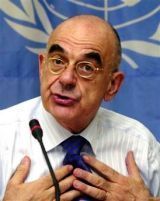Ex-Sudan envoy says UN gave in to Khartoum on Darfur resolution
August 9, 2007 (KHARTOUM) — U.N. negotiators gave in to Khartoum over a joint Darfur force, weakening it and essentially enshrining a 2006 peace deal rejected by many rebels and civilians in western Sudan, a former top U.N. envoy said.

Jan Pronk said the Sudanese government had been very successful at watering down a U.N. resolution to deploy 26,000 U.N. and African Union troops and police to Darfur, adding without strong leadership, the force would be paralysed.
While conceding that the resolution to dispatch troops was not good, Pronk said “anything is better at the moment (than) not doing anything and just talking”.
But he criticised diplomats who negotiated the resolution in New York as “amateurs” playing to their own audiences.
“This is a quick fix in order to please the population in the countries of the West,” said Pronk, the former head of the U.N.’s Sudan mission.
“There is no reason for euphoria.”
After lengthy negotiations, the U.N. Security Council last month approved a joint U.N.-AU operation to stabilise Darfur. To win Sudan’s approval for the force, deletions were made to the original version which critics have said weakened the mandate.
International experts estimate some 200,000 have died and 2.5 million driven from their homes in more than four years of rape, murder, bombing and looting in Darfur.
The International Criminal Court has issued arrest warrants for a junior government minister and a militia leader for conspiring to commit war crimes in Darfur.
Pronk said the removal, at Sudan’s request, of any mention of disarming the Janjaweed militia, mobilised by the government and accused of atrocities in Darfur, was disturbing.
“All previous … resolutions have mentioned the need to disarm the Janjaweed. Is that no longer necessary?”
Pronk added the removal of the force’s disarmament mandate was worrying in general as Khartoum had signed half a dozen agreements promising to disarm the militia, but had not done so.
The U.N. resolution for the Darfur mission includes a Chapter VII mandate on use of force.
Pronk said using Chapter VII to implement the Darfur peace deal signed by only one rebel negotiating factions last year changes the United Nations’ role in the region.
“That means that the U.N. … will have to take a position against those who do not accept the (deal) as it is. The U.N. will no longer be a neutral force.”
He said it left little room to manoeuvre for a renewed political process, which hopes to bring all factions to the negotiating table. Non-signatory rebels want to scrap last year’s deal and start from scratch.
“The Security Council resolution is more or less giving credibility to the position of the government that the (deal) cannot be changed,” he said.
Pronk says despite its weaknesses, “everything must be done to implement the decision as effectively as possible”.
“They will be paralysed,” he said. “(Khartoum) can put a very heavy burden on the mission — you need a very strong command and a very strong leadership on the ground.”
Pronk was expelled almost a year ago after angering Sudan’s army. He has not been replaced and the U.N. mission in Sudan has since lost direction, analysts say.
(Reuters)
